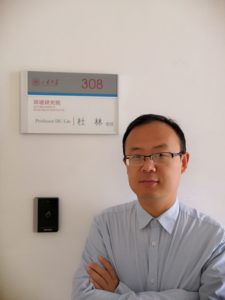Lin Du is a Professor of Environmental Sciences at the Environment Research Institute at Shandong University. He got his PhD in 2008 at the Institute of Chemistry, Chinese Academy of Sciences, and then he worked as postdoctoral fellow at University of Leuven in Belgium. In 2010, he moved to University of Copenhagen in Denmark and worked as postdoctoral researcher until 2013. He then took an assistant professor position at University of Copenhagen. In 2014, he was awarded the national 1000-plan talents program and joined Shandong University as a professor. His current research interest is environmental surface chemistry, and his group works with experimental tools to explain the surface reaction mechanisms at the molecular level. He has published more than 80 internationally refereed papers.
Read his Emerging Investigator article “Exploring the surface properties of aqueous aerosols coated with mixed surfactants” and read more about him in the interview below:
Your recent Emerging Investigator Series paper focuses on surface properties of mixed surfactants coated aqueous aerosols. How has your research evolved from your first article to this most recent article?
I worked on atmospheric gas phase reactions kinetics when I stepped into science as a PhD student at Institute of Chemistry, Chinese Academy of Sciences. My first few articles focused on ozone reaction kinetics and thereafter, through the experience of radical kinetics and infrared spectroscopy studies of the reactions and interactions of the volatile organic compounds in the atmospheric environment, I moved my research interest into environmental surface chemistry after I joined Shandong University. It has been quite straightforward to come from gas phase research and go for heterogeneous study, since both happens in the same environment. This newest paper published in ESPI shows a nice representative work of my surface study.
What aspect of your work are you most excited about at the moment?
It is very exciting to observe a single layer of molecules at the air-water interface, and more importantly, the strong and weak interactions between the molecules could also be monitored.
In your opinion, what are the most important unanswered questions about understanding air-sea exchange?
Huge amount of bubbles in the sea water bring a lot of substances into the atmosphere and the aerosol particles could also “drop” into the sea. However, different chemical composition exhibits different feature in the transferring processes. To make these processes clear at the molecular level and to “sum-up” the effects caused by these transferring at a global scale, would be one of the most important questions to solve for the air-sea exchange.
What do you find most challenging about your research?
I would say that, the challenging part for research is to find more tools to complement what we have observed with our techniques. It would be great if more collaboration with the right techniques can promote the understanding of processes occurring at the aerosol surfaces.
In which upcoming conferences or events may our readers meet you?
Currently, as a member of the local organization committee and one of the conveners of the “Smog chamber and the related lab studies” Session, I am actively involved in the 24th National Conference of Atmospheric Environment in China, which will be held on Nov. 2-4, 2018, at Qingdao. The conference is definitely a nice place where we can meet. If you cannot catch this soon-to-come conference, I will also show up at the 11th Asian Aerosol Conference (AAC) in Hong Kong, May 27-30, 2019.
How do you spend your spare time?
Spending time with my family is always on the top of my wish list. Sometimes I travel with my 9-year-old son to visit different cities, and I enjoy very much this kind of father-and-son-only trip. Staying at home and taking care of my 9-month-old daughter is also something I enjoy as a father since the day she was born. Bringing my wife to a nice restaurant and having a memorable dinner is also my favorite.
Which profession would you choose if you were not a scientist?
I would choose to be a diplomat. I feel as a diplomat, one can bring benefits to general public and a country. Just as a scientist, we spend great efforts to create and spread the knowledge, to let the public all benefit.
Can you share one piece of career-related advice or wisdom with other early career scientists?
There are so many things to learn as an early career scientist, however there is no text book showing exactly what and how to learn. My advice is to communicate with others including early career scientists, and also senior established scientists. They might not give you the direct answers to your questions, but they definitely can bring you new ideas and help you. This advice is valid for hands-on research, career development, soft skills, and so on.











